Rule No. 1 for a whodunit: Don't give away the ending too early.
That goes double for PBS' "Magpie Murders" because of its mystery-within-a-mystery format. In the series, publisher Susan Ryeland (Lesley Manville) discovers that the final chapter (and therefore the solution) of the murder mystery she's editing is missing. What's worse, the novel's author Alan Conway (Conleth Hill) has also died, taking all answers with him. The "Magpie Murders" opening credits sequence encapsulates this dual narrative, traveling between the pages of the 1950s-set whodunit to the real-life mystery at the heart of the writer's death.
The graphically bold main titles – told in bright red and black illustrations – blend images one into another, oscillating between murder and writing imagery. Fluttering manuscript pages assemble themselves into a staircase down which a body falls. A fountain pen literally becomes a sword. Another body plummets, only to dissolve into a flurry of books. Throughout, Murray Gold's sprightly theme song plays, giving an upbeat energy to the cozy mystery. By the end, two resolute figures stand side by side as the series' title flashes onscreen.
Anthony Horowitz adapted "Magpie Murders" for TV based on his own novel of the same name. Ben Hanbury of the Emmy-winning Huge Designs, fittingly was reminded of the publishing world while creating the series' main titles.
"I often think it's a bit like a book cover," Hanbury told Salon. "We want the titles to be something which gets the viewer excited about what they're going to see and gives them a flavor of what it's about. . . . My hope would be that people would find it exciting and intriguing. What does that mean and what does this means? And then maybe that would make more sense as we went along."
Much like a murder mystery novelist, Hanbury must dole out just enough clues to fascinate and flummox . . . but not tip the hand. He acknowledges it's a bit of a tightrope act, one that required he actually remove one image that may have given too much away.
"I think they decided that was too much of a spoiler," Hanbury said after showing Salon the confidential image. "That's the balance, isn't it? We need to work out what's going to allude to the story and what maybe is too far past that line."
Take a look at the "Magpie Murders" main titles:
Magpie Murders Opening Titles from HUGE on Vimeo.
The design and overarching concept
The striking colors and graphic style are what catch the eye first. Although they somewhat echo the colors of the book's original cover, Hanbury actually found inspiration elsewhere in the publishing world.
"Initially, I was inspired by Penguin Books, which in the '60s did loads of crime novels that I would imagine were very quickly and cheaply thrown out there," said Hanbury. "They're all white, black and green and they have graphics on the front, often very compelling and quite simple . . . very concise. And I thought it's quite an idea to really make an almost stripped-down and pare back the visual language. I started with green and orange and then through tweaking just decided red was a bit more striking."
The simple style allows Hanbury to play with incongruous objects, upending expectations by playing with their sizes. For example, the main titles open to what look like bells chiming – in time to notes in Murray Gold's tinkling theme song – but pull out and invert to reveal themselves to be typewriter keys going up and down.
"The nice thing about having such a simple style and simple palette is it really frees you up to play with scale," said Hanbury, "to be really close in on typewriter keys and then be zoomed out on a giant staircase. I felt like that was part of the excitement of it, that you could be really macro and and really wide. That would keep the energy going."
Anagrams and fatal descents
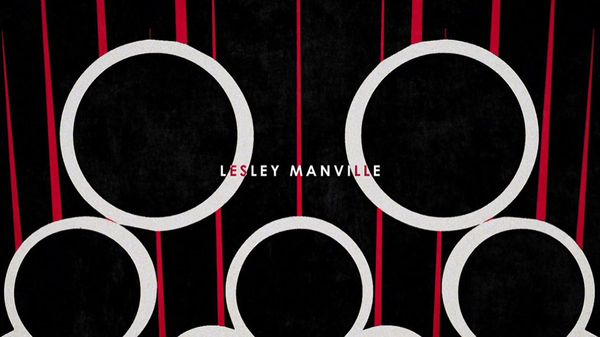 Magpie Murders title sequence card - typewriter keys (HUGE Designs)
Magpie Murders title sequence card - typewriter keys (HUGE Designs)
As the names of the actors and various behind-the-scenes talent appear on screen, their letters are first jumbled up before resolving into the correct order. This is a direct reference to the author Alan Conway's penchant for making anagrams. In the series, he even uses his fictional detective Atticus Pünd's name as the inspiration for an anagrammed computer password: "CAT UP NUDIST." Although Hanbury initially wanted each name to appear in a coherent anagrammed form first, he gave that up since they were onscreen too briefly to be read that way.
"I thought that was quite a nice part story where you realize that Atticus Pünd is an anagram," said Hanbury. "At the time, I thought oh wouldn't it be really funny if all the cast names came in as anagrams . . . I think I had one or two but that was a lot because they're only there for like one frame."
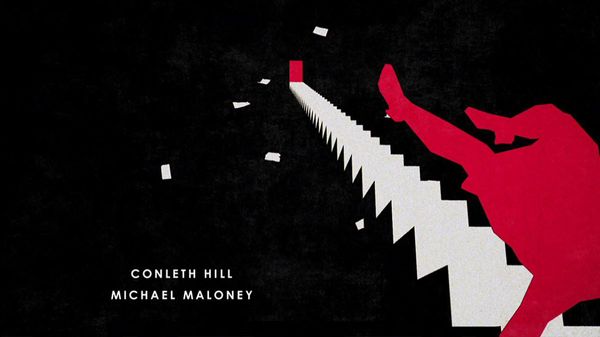 Magpie Murders title sequence card - falling down stairs (HUGE Designs)
Magpie Murders title sequence card - falling down stairs (HUGE Designs)
Of the many images he wanted to work in is the first death that Alan Conway writes in the book involving a housekeeper who tumbles down the stairs of Pye Hall.
"I thought that having this giant staircase was a question that came to mind because that's the first murder that happens in there for the housekeeper," he said. "I thought that would just be amazing to go through a doorway and suddenly fall right down."
This is not the only tumble someone takes, however. Author Alan Conway's death falling off a tower is initially ruled a suicide, but the more Susan investigates, the more likely it seems that he's been murdered. In this case, Hanbury depicted the falling body straight onward, reminiscent of the Saul Bass design for Alfred Hitchcock's "Vertigo" film poster.
"It was very silhouetted. Hopefully, that didn't give too much away," said Hanbury. "Sometimes we'd certainly like to plant little Easter eggs that maybe aren't obvious in the first viewing. But as you go into other episodes or repeat viewings, you see that was what that means. I think I thought it would be quite a nice visual cue to see the death of Alan. And then as he falls, his body is turning to books, almost like that's the depth of his his empire."
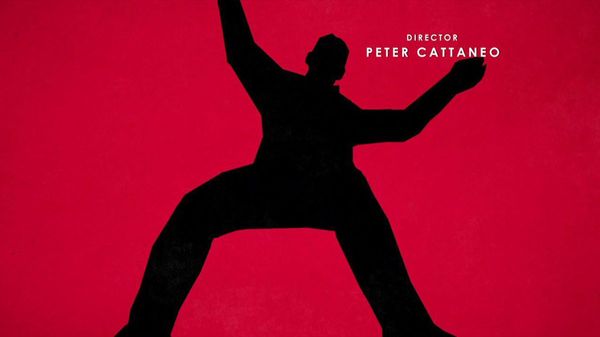 Magpie Murders title sequence card - falling man silhouette (HUGE Designs)
Magpie Murders title sequence card - falling man silhouette (HUGE Designs)
The visual dual narrative
Deciding on the narrative of the main titles was tricky as well since it would involve telling two stories and how they dovetail together. Author Alan Conway drew inspiration from his own life, which means that many people he knew appeared as alter egos in his period novel.
"When I read the scripts, what I really loved is that there's this dual storyline going on. On one hand, you have the story of the editor Susan, and she's investigating the death of the author, Alan. And he has this other story, the story of his final novel, that of Atticus Pünd. In the show, it jumps from one story to the next, but they all blend quite seamlessly together and often have the same people appear in both stories and have the same locations in both stories.
"So I thought, Oh, I'd love to try and capture that dual story that also is one story," he continued. "I have to come up with a visual language that would hint at that thing. I thought we can have one color palette for the world of the author, and then a slightly inverted palette for the world of the novel. And then objects can travel through both those worlds. And we can zip between one another in the same way that the story does on the show."
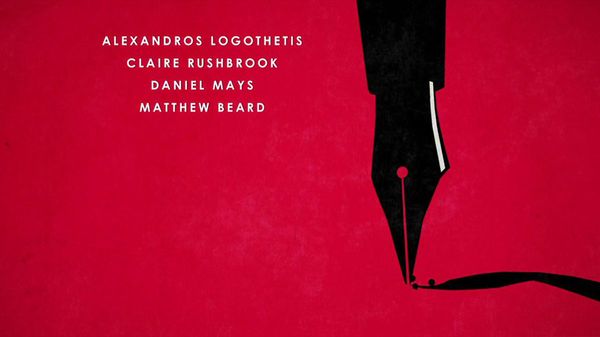 Magpie Murders title sequence card - fountain pen (HUGE Designs)
Magpie Murders title sequence card - fountain pen (HUGE Designs)
The visual language of the transitions also allowed for movement in the sequence, which naturally led to a sequence where Susan drives her convertible down the road to Alan's home of Abbey Grange, which is the inspirational blueprint for the book's manor Pye Hall, where a key murder takes place.
"I thought it'd be really nice to have a fountain pen go into that tiny little detail and becomes a sword," said Hanbury. "The camera swings around at that point, and then you suddenly have this one-point perspective of a road. I was really keen to get Pye Hall, which is also the home of Alan. That's one of the few objects which appears with a line down the middle and appears on both the red background and the black background. That ended up being the nice segue.
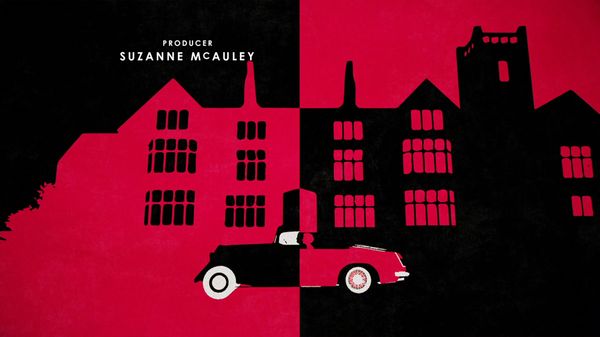 Magpie Murders title sequence card - manor split screen (HUGE Designs)
Magpie Murders title sequence card - manor split screen (HUGE Designs)
The credits finish with silhouettes of editor Susan Ryeland and the book's detective, Atticus Pünd. In the series, Susan actually begins to imagine conversations with Pünd, who gives her hints on how to parse through the various clues in murder mysteries.
"The split-screen, that dual part, was because you see this partnership of Susan and Atticus, almost like they're working together in different worlds. So I thought I thought that was really fascinating that you have these two characters that on one hand, we separate, but on the other hand, almost like it could be in a classic sort of crime detective partnership."
The magpie masquerade
Although it wasn't Hanbury's job to include any red herrings in the main titles, there was another animal he included that could prove a bit distracting. The magpies of the title are a reference to the nursery rhyme correlating the number of magpies seen with good or bad luck:
One for sorrow, two for joy
Three for a girl, four for a boy
Five for silver, six for gold
Seven for a story yet to be told
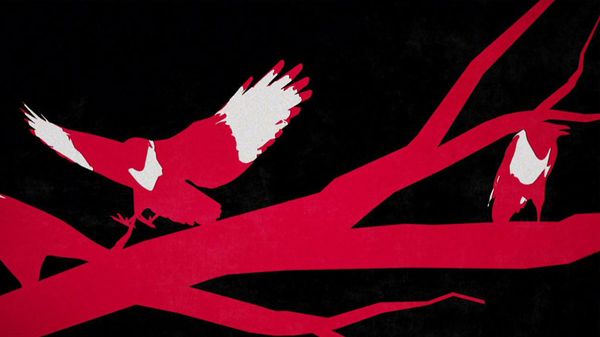 Magpie Murders title sequence card - Magpies (HUGE Designs)
Magpie Murders title sequence card - Magpies (HUGE Designs)
Knowledgeable ornithologists looking at the magpies in the credit sequence might notice that something is a bit off.
"The birds in the titles aren't actually magpies," Hanbury admitted. "Often we have to work quickly and find 3-D models that we can use and that are already rigged. We found one of a raven or crow, or bird that is slightly similar, and then I had to basically edit the module and start painting and adding bits of white to make it more magpie-looking. But I think the keen-eyed birdwatcher would realize the shape's a bit different."
"Magpie Murders" airs Sundays at 9 p.m. on PBS.
Read more
about this topic
- Those magical "Only Murders in the Building" main titles – including each hidden Easter egg
- The cozy "Maltese Falcon": How "Murder, She Wrote" reinvented mysteries forever
- "Magpie Murders" is a metafiction marvel: Anthony Horowitz on adapting his mystery within a mystery
- From Poirot to Pünd: How "Magpie Murders" evolved its outsider detective


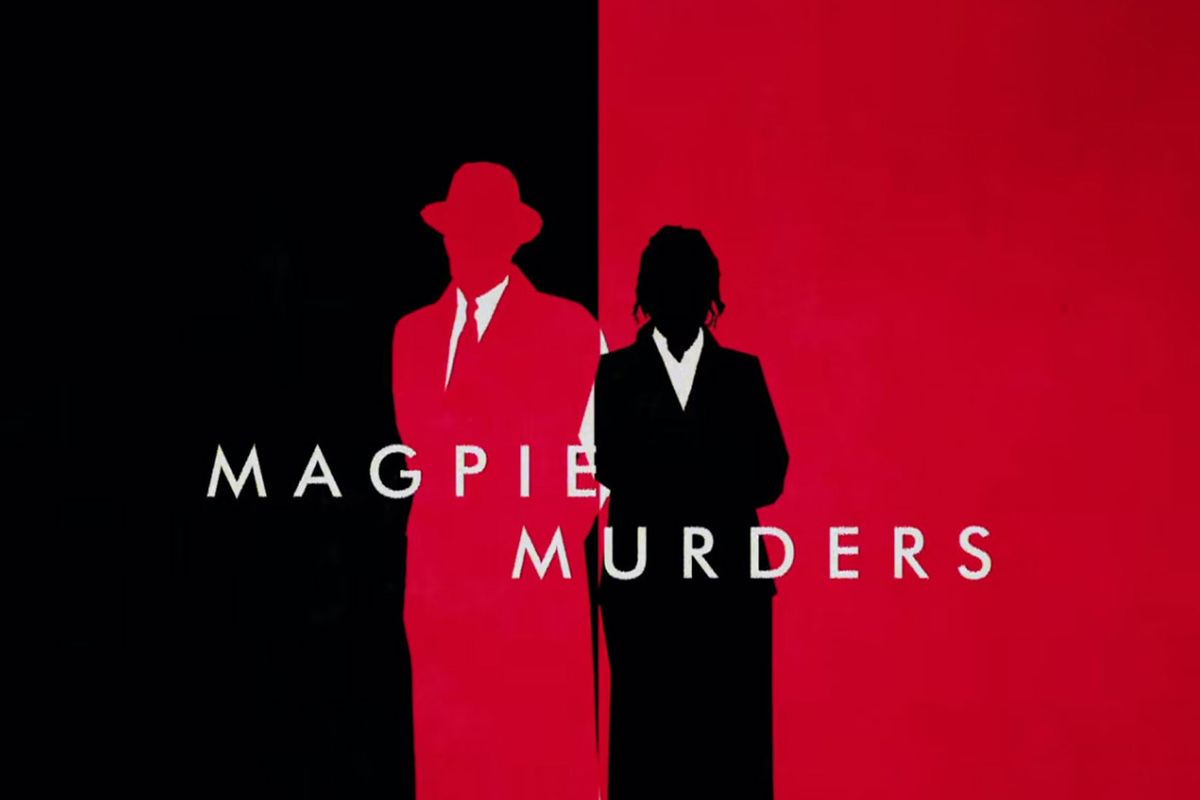
Shares